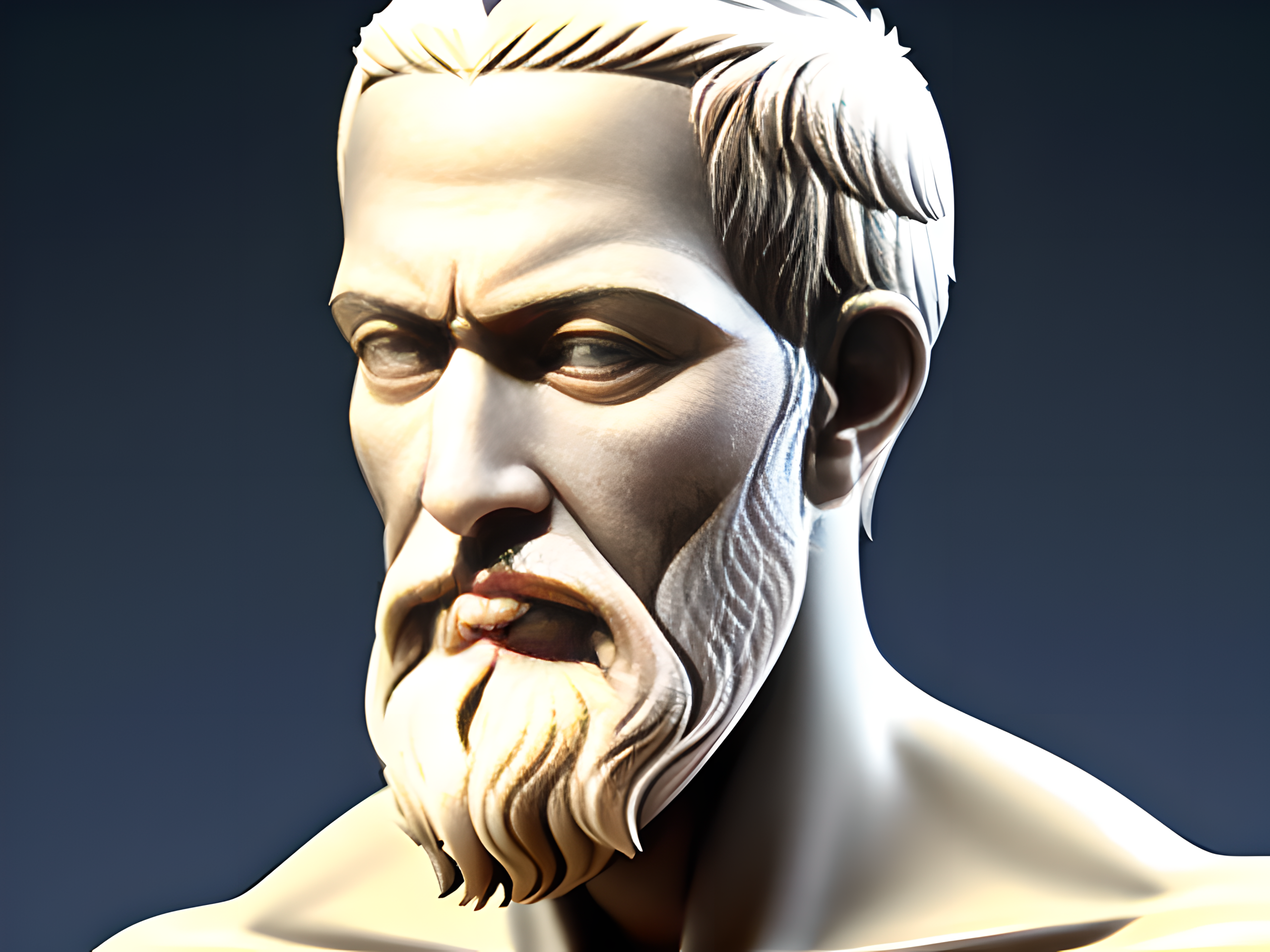Understanding the Dichotomy of Control: A Stoic’s Guide to Serenity
Lesson 5
Embrace the dichotomy of control and find inner peace. Focus on what you can control, and let go of what you can't. It's the key to success and happiness.
🌟💫 #DichotomyOfControl #FindYourBalance

Have you ever found yourself at the mercy of a situation, feeling like a leaf tossed in the wind? This is where the dichotomy of control steps in, offering a lifeline to clarity and calm in the chaos of life.
It's a simple yet profound principle that can revolutionise how we handle our daily struggles.
In this lesson, we'll unravel the layers of this Stoic wisdom, guiding you toward serenity in a world that often feels out of control.
Join us as we explore the roots, principles, and practical applications of the dichotomy of control and discover how this ancient philosophy remains strikingly relevant in our modern lives.
The dichotomy of control is derived from Stoic philosophy that distinguishes between things within our power and those without. It emphasises the importance of focusing our efforts and attention on what we can control and accepting what we cannot control.
According to the dichotomy of control, our thoughts, choices, and actions are within our control.
These are our internal states or virtues, such as judgment, desires, and values. We can choose how we respond to external events and circumstances.
On the other hand, external events and circumstances, such as the actions and behaviours of others, the weather, or natural disasters, are considered to be beyond our control.
These are referred to as external or indifferent things. According to the dichotomy of control, we should not place our happiness or well-being on things outside our control, as they are uncertain and can easily change.
The dichotomy of control encourages individuals to focus on developing their character, virtues, and wisdom, as these are within their power. By accepting what we cannot control and directing our efforts towards what we can control, we can find inner peace, freedom, and resilience in the face of adversity.
In psychology today, the dichotomy of control is often employed in cognitive-behavioural therapy (CBT) and other therapeutic approaches. By helping individuals recognise and differentiate between what is within their control and what is not, therapists aim to empower their clients to make positive changes in their lives and develop resilience in the face of adversity.
The principle says that peace of mind comes from focusing on and acting upon things within our control, like our beliefs, judgments, and actions. It also means accepting and letting go of things not in our power, like the actions and opinions of others.

Therefore, according to the Enchiridion (Handbook). Stoics thought there were only two things we had direct control over, voluntary actions and how we think about things. Therefore, considering, that Epictetus had famously reasoned that people are disturbed not by events but by their judgments about their circumstances.
It is important to note that the dichotomy of control does not imply that individuals should completely ignore or disregard external circumstances or factors beyond their control. Instead, it emphasises the need to focus on what can be influenced and to develop a mindset that promotes acceptance and resilience in dealing with the uncontrollable aspects of life.
Table of Contents
Introduction to the Dichotomy of Control
The Stoic Philosophy and Its Central Tenets
Epictetus and the Birth of the Dichotomy of Control
The Enchiridion and Its Role in Stoic Teachings
The Principles of the Dichotomy of Control
What Is Within Our Control?
What Lies Beyond Our Control?
The Trichotomy of Control: A Modern Adaptation by William B. Irvine
Historical Context of the Dichotomy of Control
The Life and Times of Epictetus
The Legacy of Arrian in Preserving Stoic Wisdom
The Dichotomy of Control in Practice
Applying the Dichotomy to Everyday Life
Anecdotal Wisdom: Advice to One's Younger Self
The Dichotomy of Control vs. The Serenity Prayer
Expert Insights and Philosophical Reflections
Epictetus on Focusing on What We Can Control
Viktor Frankl and the Challenge to Change Ourselves
Stephen Hawking on Predestination and Control
The Dichotomy of Control in the Modern World
The Timeless Relevance of Stoic Philosophy and Stoic Wisdom
Adapting Ancient Wisdom to Contemporary Challenges
Conclusion
Key Takeaways
The Stoic Dichotomy of Control (DOC) distinguishes between what is within our control (opinions, motivations, desires, aversions, and actions) and what is not (body, property, reputation, office).
Epictetus, a Stoic philosopher, articulates the Dichotomy of Control, emphasising the importance of focusing on what we can control.
The Dichotomy of Control provides a practical framework for problem-solving by dividing situations into segments we can maintain and cannot.
The Dichotomy of Control has been adapted for modern times by William B. Irvine, who proposed a Trichotomy of Control.
The Dichotomy of Control offers timeless wisdom and can be applied to everyday life, helping us navigate challenges and cultivate serenity.
Introduction to the Dichotomy of Control
Stoic philosophy's heart lies in a powerful concept known as the dichotomy of control. It's a principle that delineates the boundary between what is in our power and what lies outside it.
Understanding this dichotomy is crucial for cultivating a sense of peace and resilience. By recognising the limits of our influence, we learn to invest our energy wisely.
The Stoics, including Epictetus, taught that clarity in this distinction is the key to a harmonious life. They asserted that much of our discontent stems from confusing what we can control with what we cannot.
This realisation empowers us to let go of futile struggles against the unchangeable. Instead, we focus on our own actions, attitudes, and beliefs—the core aspects of life that are indeed ours to shape.

Adopting this mindset is transformative, offering a path to tranquillity amidst life's inevitable turbulence. It's a philosophy that doesn't just enrich individual lives; it also has the potential to improve societal cohesion by fostering acceptance and understanding.
In essence, the dichotomy of control is a compass for navigating the complexities of human existence. Once mastered, it's a tool that can lead to profound personal growth and a more philosophical approach to life's challenges.
The Stoic Philosophy and Its Central Tenets

Epictetus, the Stoic philosopher, carved his niche in the annals of philosophy with a piercing insight into human agency: the dichotomy of control. Born into slavery in the Roman Empire, Epictetus's life was a testament to his teachings—showing that external circumstances do not shackle inner freedom.
His philosophy emerged from the crucible of personal hardship, teaching that the path to serenity lies in distinguishing between what we can control and what we cannot. This dichotomy became the cornerstone of his philosophical system, a beacon for those seeking tranquillity in tumultuous times.
Epictetus posited that true power is rooted in the governance of one's own responses, not in dominance over others or the caprices of fate. His lectures, compiled by his student Arrian, were imbued with the idea that our reactions to events are within our control, while the events themselves often are not.
Epictetus offered a radical form of empowerment through this lens: a call to introspection and mastery over one's internal world. His enduring legacy is that while the external may be beyond our reach, the inner landscape is ours to cultivate.
In the tapestry of Stoic philosophy, Epictetus's dichotomy of control is a golden thread, weaving through the ages as a guide to resilience and stability.
Epictetus and the Birth of the Dichotomy of Control
Epictetus, born a slave in the Roman Empire, his life was a testament to his teachings—showing that external circumstances do not shackle inner freedom. Epictetus's journey to freedom is like a phoenix rising from the ashes. Despite being born into slavery, he managed to transcend his circumstances and attain inner freedom through the practice of Stoicism.
His philosophy emerged from the crucible of personal hardship, teaching that the path to serenity lies in distinguishing between what we can control and what we cannot. This dichotomy became the cornerstone of his philosophical system, a beacon for those seeking tranquillity in tumultuous times.
Whereas, Nelson Mandela's path to freedom is like a river carving its way through the mountains. Despite facing immense obstacles and spending decades in prison, he persevered, breaking down the barriers of apartheid and ultimately achieving the freedom and equality he fought for.
Epictetus and Nelson Mandela's pursuit of freedom is like a marathon. Both faced long and gruelling journeys, enduring hardship and adversity along the way. Yet, they persevered, displaying remarkable resilience and strength to reach their ultimate goal of freedom.
Epictetus posited that true power is rooted in governance of one's own responses, not in dominance over others or the caprices of fate. His lectures, compiled by his student Arrian, were imbued with the idea that our reactions to events are within our control, while the events themselves often are not.
Epictetus offered a radical form of empowerment through this lens: a call to introspection and mastery over one's internal world. His enduring legacy is the notion that while the external may be beyond our reach, the internal landscape is ours to cultivate.
In the tapestry of Stoic philosophy, Epictetus's dichotomy of control is a golden thread, weaving through the ages as a guide to resilience and equanimity.
The Enchiridion and Its Role in Stoic Teachings
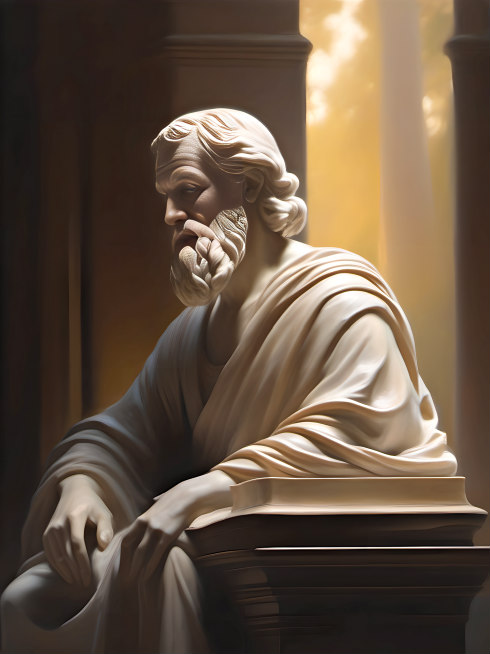
The Enchiridion, often known as the Handbook of Epictetus, is a Stoic manual for living. This concise text distils the wisdom of Stoicism into actionable guidance, emphasising the dichotomy of control as its central theme.
It serves as a practical guide for applying philosophical principles to everyday life, instructing readers on navigating the human experience with grace and resilience. The Enchiridion reinforces the Stoic belief that external events are beyond our control and should not be the focus of our emotional energy.
Instead, it encourages the cultivation of personal virtues such as courage, justice, and self-discipline. Through its teachings, the Enchiridion has been instrumental in shaping the Stoic tradition, providing a foundation for subsequent generations to build upon.
Its role extends beyond mere philosophical instruction; it is a tool for transformation, urging individuals to internalise Stoic wisdom and embody it through their actions. The enduring influence of the Enchiridion is evident in its continued relevance, offering guidance that is as applicable today as it was in ancient times.
It remains a seminal work in the philosophy of personal ethics and the pursuit of a life well-lived.
The Principles of the Dichotomy of Control
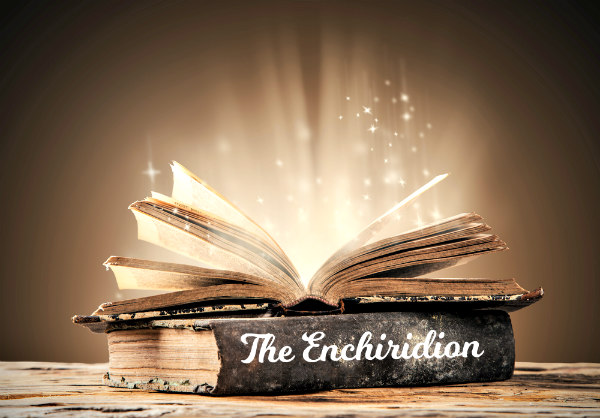
At the nucleus of Stoic serenity lies the dichotomy of control, an enduring precept that serves as a beacon to navigate the tumult of existence. A philosophical compass orients us towards what truly lies within our influence.
This Stoic maxim teaches that life's events are split into two categories: those we control and those we do not. Understanding this dichotomy is pivotal; it's the fulcrum upon which our emotional well-being balances. It teaches us that our power resides not in altering the external, but in mastering the internal.
The principles of this dichotomy are simple, yet their application is profound.
They prompt a recalibration of focus away from the externalities that often dictate our emotional state. It's about steering our ship with intent, focusing on our actions, motives, and responses.
The Stoics counselled that we should invest our energies in our choices and dispositions. Because here lies the essence of control – in the domain of our personal will and ethical stance. When we embrace this doctrine, we unlock a reservoir of resilience.
We learn to meet life's unpredictability not with resistance but equanimity, fostering an inner sanctuary untouched by the chaos that swirls outside.
What Is Within Our Control?
In the grand tapestry of life, the threads we can truly grasp and manipulate are those of our own actions and attitudes. It's a domain governed by personal will, where individuals hold sovereignty over their choices and responses to life's unfolding drama.
This realm of control encompasses our values, the principles we stand for, and the ethical compass that guides our decisions. Here lies the power to forge our character to cultivate virtues such as courage, temperance, and integrity, which stand as pillars in the architecture of our inner strength.
It extends to our perceptions, the lenses through which we view the world. We can reframe our thoughts, choose optimism over pessimism, and find gratitude amidst adversity.
Our emotional reactions are also within our purview; we can learn to respond with equanimity rather than be hijacked by raw impulses.


Moreover, within this scope of influence lies our capacity for reasoned judgment and deliberate action. The conscious pursuit of wisdom and self-improvement is a choice available to us all, as is the ability to extend kindness and practice empathy.
Ultimately, what we control is the essence of our being, the core of what it means to be human. It's the space where we can enact change, sculpting our destiny with the chisel of free will.
What Lies Beyond Our Control?
In the intricate dance of existence, certain elements elude the grasp of our intentions, existing beyond the realm of our dominion. These are the unpredictable currents of life—the external events and circumstances that unfold independently of our desires and actions.
It is here, in the theatre of the uncontrollable, that we encounter the vicissitudes of fate:
- The genetic lottery of birth
- The caprices of weather
- The complex web of societal dynamics
These forces shape the backdrop against which our narratives unfold, often dictating our challenges and opportunities.
The actions of others lie outside our sway, as each individual operates from their centre of autonomy.
We cannot dictate another's thoughts, beliefs, or choices more than we can command the moon to sway the tides.
While partially influenced by lifestyle choices, our health is ultimately subject to the enigmatic workings of biology and chance.
Accidents, illnesses, and the relentless march of time are companions on our journey, reminding us of our inherent fragility.
Recognising what lies beyond our control is not an invitation to resignation, but a call to focus our energies where they matter most. Acknowledging this boundary liberates us from the futile pursuit of the unattainable, channelling our vigour into the fertile ground of what we can influence.
The Trichotomy of Control: A Modern Adaptation by William B. Irvine
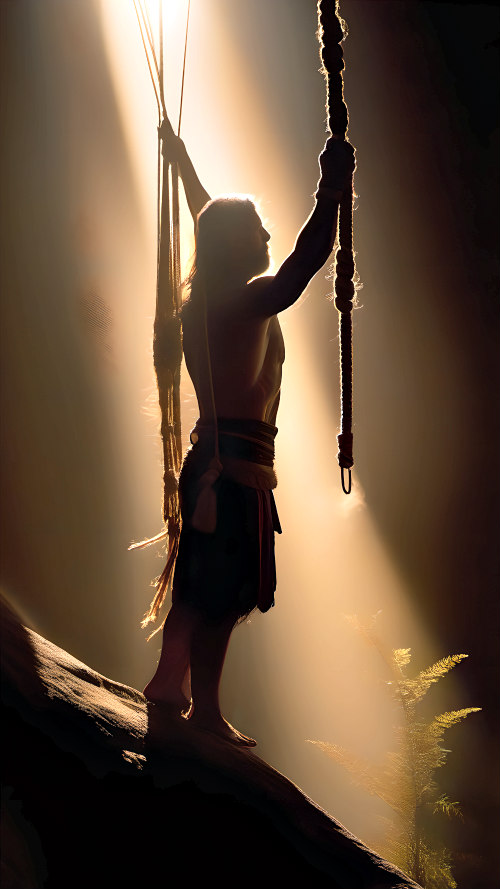
William B. Irvine, in his exploration of Stoic philosophy, recognised that the binary dichotomy of control might be too rigid for today's refined modern life. He proposed an updated model, the Trichotomy of Control, introducing a third category to the classic Stoic framework.
This additional category encompasses things over which we have some but not complete control. For instance, you might influence but not guarantee the success of a job interview through preparation and presentation. Irvine's adaptation acknowledges the grey areas that the original dichotomy might overlook, creating a more flexible and applicable approach to modern challenges.
The trichotomy consists of things we can control, things we can't control, and things we have some control over. By recognising this third category, Irvine provides a more granular understanding of our agency. It allows us to engage with aspects of our lives more strategically, evaluating where our efforts can be most effective.
Irvine's modern adaptation doesn't replace the original teachings of Epictetus, but rather complements them. It encourages a proactive approach, where one assesses the degree of control in any given situation and acts accordingly. This subtle perspective empowers individuals to navigate life's complexities with a more tactical and reasoned approach, aligning with the Stoic ideal of living in harmony with the flow of life.
Historical Context of the Dichotomy of Control
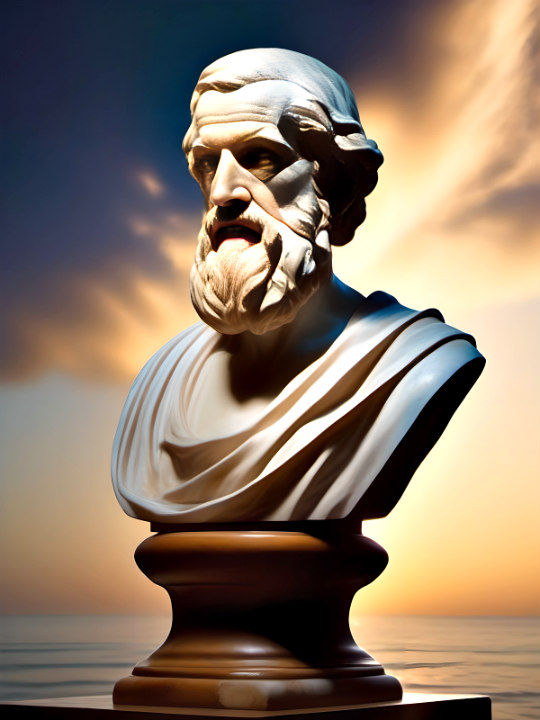
The Stoic philosopher Epictetus, born into slavery around 50 CE, emerged as a pivotal figure in ancient philosophy. His life's narrative, marked by the transition from bondage to intellectual freedom, offers a compelling backdrop to his seminal work on the dichotomy of control.
Epictetus's teachings crystallised during the zenith of the Roman Empire, a period rife with social and political upheaval. This era's unpredictability and the personal adversity he faced undoubtedly shaped his philosophical inquiries into the nature of human agency and acceptance.
He proposed a clear divide exists between what we can control—our own actions and attitudes—and what we cannot, such as the actions of others and external events. This distinction was revolutionary, challenging the prevailing fatalistic attitudes of the time and empowering individuals with a sense of autonomy over their internal world.
The dichotomy of control, as articulated by Epictetus, was preserved through the writings of his student Arrian. These texts, particularly the Enchiridion, became vital conduits for Stoic thought, influencing later generations of philosophers and thinkers.
The historical significance of the dichotomy of control lies in its enduring relevance. It has transcended the confines of its era, offering a timeless framework for resilience and personal empowerment in the face of life's uncertainties.
The Life and Times of Epictetus
Epictetus, was born into the harshness of slavery in Hierapolis, Phrygia, and his early years were marked by the tribulations of servitude, a crucible that forged his resilient philosophy on the nature of freedom and control.
Despite his status, he was permitted to study Stoic philosophy, a rare opportunity that became the bedrock of his intellectual pursuits. His master, Epaphroditos, allowed him access to the teachings of Gaius Musonius Rufus, which profoundly shaped his philosophical outlook.
Upon gaining his freedom, Epictetus began teaching philosophy in Rome until 93 CE, when Emperor Domitian banished all philosophers. This expulsion led him to Nicopolis in Epirus, Greece, where he established his own philosophical school.
There, his lectures attracted many of society's elite, drawn by his reputation for wisdom and the practical nature of his teachings. Epictetus's influence extended far beyond the walls of his school, as his ideas on the dichotomy of control resonated with a broad audience seeking serenity amidst the unpredictability of life.
His enduring legacy is a testament to the transformative power of his ideas, particularly the notion that true freedom comes from within. Although he wrote nothing himself, his pupil Arrian diligently recorded his thoughts, ensuring that the wisdom of this once-enslaved philosopher continued to inspire through the centuries.
The Legacy of Arrian in Preserving Stoic Wisdom
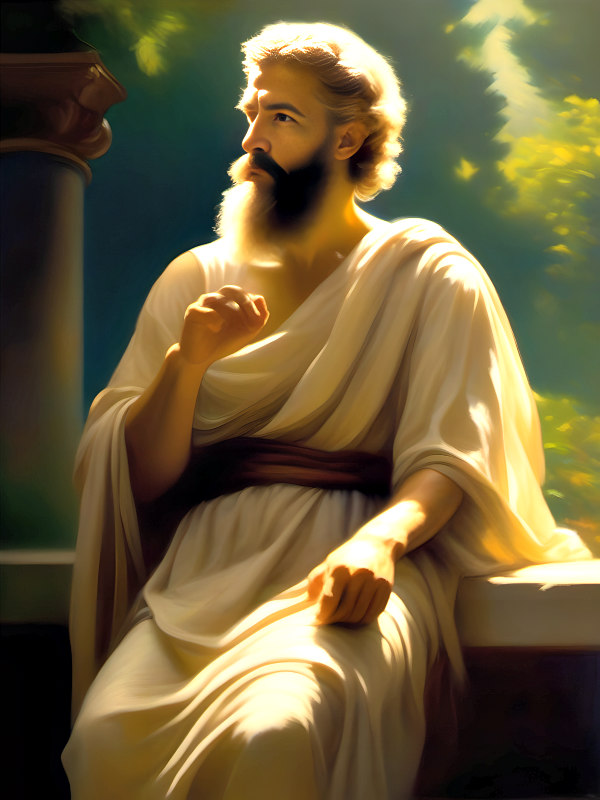
Arrian's role in immortalising Stoic philosophy cannot be overstated. As a devoted student of Epictetus, his meticulous documentation of his mentor's discourses ensured that the profound insights of Stoicism were preserved in the sands of time.
Arrian's works, notably the 'Discourses' and the 'Enchiridion,' are pivotal texts that have carried the essence of Epictetus's teachings through millennia. They bridge the ancient world and modernity, allowing us to access the timeless wisdom that might have otherwise faded with the philosopher's passing.
His dedication to capturing Epictetus's spoken word with authenticity and clarity was driven by a deep reverence for the practicality and impact of his teachings.
Arrian recognised that the principles of Stoicism, particularly the dichotomy of control, held the key to navigating the complexities of human life.
He preserved his teacher's intellectual legacy and enriched humanity's philosophical tapestry through his efforts.
The legacy of Arrian is thus inextricably linked to the survival and resurgence of Stoic thought in contemporary discourse.
His commitment to preserving these teachings underscores the enduring human quest for wisdom and the power of mentorship in shaping the intellectual heritage of civilisations.
Arrian's work is a testament to the transformative power of philosophy and its capacity to transcend generations, offering guidance and solace to those who seek it.
The Dichotomy of Control in Practice

Implementing the dichotomy of control into our daily lives begins with a subtle shift in mindset. It's about recognising moments when we're grappling with the uncontrollable and consciously redirecting our focus inward.
This practice is not a one-off endeavour but a continuous process of self-reflection and adjustment. Each day presents a myriad of scenarios where this philosophy can be applied, from traffic delays to interpersonal conflicts.
In these instances, the dichotomy of control teaches us to detach from the frustration of the unchangeable. Instead, we probe our repository of inner resources, seeking responses that align with our values and desired outcomes.
By doing so, we reclaim power over our emotional state, cultivating calm in the face of life's storms. It's an exercise in discernment, distinguishing between futile resistance and constructive action.
For example, when faced with a professional setback, we analyse what aspects of the situation are within our grasp rather than stewing in defeat.
It could be our attitude towards failure, our strategy for future endeavours, or our resolve to persevere.
Embracing this practice instils a resilience that is both liberating and empowering.
It's the art of serenity, mastered through the Stoic wisdom of focusing on what we can control and releasing what we cannot.

Applying the Dichotomy to Everyday Life

Incorporating the dichotomy of control into our daily routine is akin to cultivating a garden of tranquillity in our minds. It begins with the seeds of awareness, recognising the moments when externalities cloud our judgment and disturb our peace.
We must tend to these seeds by consciously focusing on our internal landscape. This means nurturing the aspects of life we can influence, such as our reactions, and letting the uncontrollable elements be.
It's a process that demands vigilance and consistency, as the external world is rife with triggers that can easily uproot our serenity. Each decision to act within our sphere of control is a deliberate step towards a more balanced state of being.
Imagine facing a sudden downpour without an umbrella. Instead of succumbing to irritation, we can embrace the experience, finding joy in the unexpected or using the time to practice patience.
Such a mindset transforms perceived obstacles into opportunities for personal growth. By applying the dichotomy of control to everyday life, we rewire our reflexes to embrace challenges with grace and composure.
This Stoic practice is not about disengagement, but about meaningfully engaging with life. It's a powerful tool that, when wielded with intent, can significantly enhance our daily experience.
Anecdotal Wisdom: Advice to One's Younger Self

Imagine whispering across the chasm of time, offering pearls of wisdom to the youthful version of yourself. Picture imparting the essence of the dichotomy of control, that Stoic compass which could have steered you through the upheavals of adolescence and beyond.
If one could, the most profound advice would be to discern between the malleable and the immutable in life's vast tapestry we find ourselves intertwined, each thread uniquely woven. It's about understanding that while we cannot command the winds of fate, we can only adjust our sails for our voyage through uncharted territory, with fresh possibilities.
You would tell your younger self to embrace this truth: energy expended on the unchangeable is wasted. Instead, invest in the fertile soil of your actions, where effort bears fruit.
Instruct them to let go of the reins of external circumstances, for these wild horses cannot be tamed. Instead, guide them to cultivate the garden of their inner world, where every thought and action is a seed that grows into the forest of their future.
Assure them that while they cannot predict the path of every river, they can navigate their own vessel with skill and heart. This mastery, this tranquil acceptance of life's ebb and flow, is the secret to a serene and purposeful existence.
The Dichotomy of Control vs. The Serenity Prayer
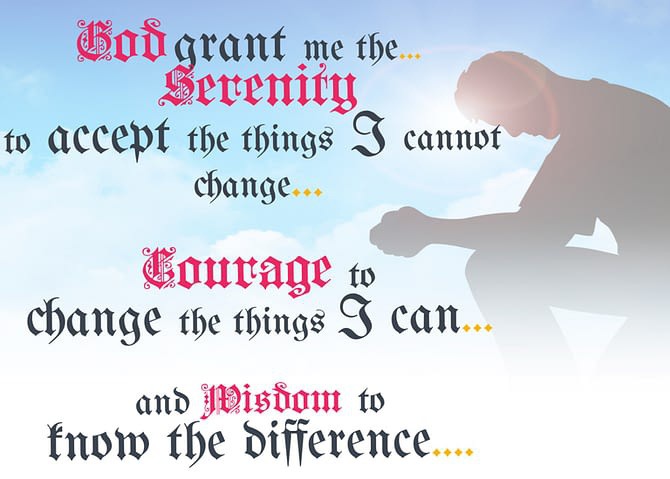
The dichotomy of control and the Serenity Prayer intersect at a profound crossroads of acceptance and action. Both philosophical guideposts teach the art of discerning between the changeable and the immutable in the tapestry of existence.
The Stoic principle of the dichotomy of control urges us to focus our energy solely on what lies within our power—our attitudes, beliefs, and actions. It's an ancient call to internal mastery, echoing through time as a testament to human agency.
Conversely, the Serenity Prayer, a modern spiritual beacon, petitions for serenity to accept the things we cannot change, courage to change the things we can, and wisdom to know the difference.
This prayer encapsulates a universal yearning for peace amidst life's uncontrollable elements and the fortitude to shape our destiny where possible.
While the dichotomy of control is rooted in Stoic philosophy, advocating for a self-driven life, the Serenity Prayer invites divine grace to navigate the interplay of fate and free will.
Both paths converge on the wisdom of discernment yet diverge in their source of empowerment—one from within, the other seeking external support.In essence, they complement each other, offering a dual-lens through which we can view life's challenges.
Together, they form a powerful paradigm for living, blending ancient Stoicism with contemporary spirituality to foster resilience and inner tranquillity.
Expert Insights and Philosophical Reflections
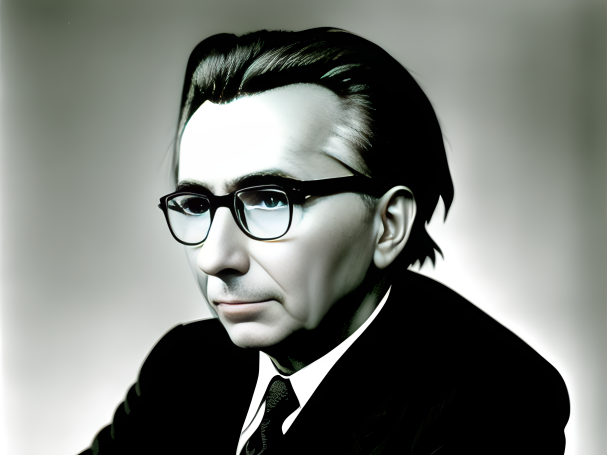
When Epictetus spoke of the dichotomy of control, he illuminated the path to liberation through self-mastery. His words, "The chief task in life is simply this: to identify and separate matters," echo the Stoic's pursuit of clarity in chaos.
Viktor Frankl, an Austrian psychiatrist and Holocaust survivor, expanded upon this Stoic wisdom. He proposed that when circumstances are immutable, the profound challenge—and opportunity—lies in changing ourselves.
Viktor Frankl's experiences in Nazi concentration camps during World War II His wife, father, mother and brother all died in Nazi concentration camps; had a profound impact on his understanding of human suffering and resilience.
Viktor Frankl asserted that our last freedom is the choice of attitude, an excellent example of how one can choose to focus on the present moment, even in the face of unimaginable adversity.
He recognised that while we cannot avoid suffering, we can choose how to cope, find meaning, and move forward with renewed purpose. This realisation is the bedrock of his therapeutic approach, logo therapy, which focuses on finding meaning and purpose in life, even in the darkest moments. Which posits that our primary drive in life is the pursuit of meaning, not pleasure.
He observed that those who were able to find meaning and purpose in their lives were more likely to survive and overcome the hardships they faced.
Both Viktor Frankl and Nelson Mandela understood that they could not control their external circumstances, but they had the power to control their thoughts and reactions to those events. It is important to recognise that our thoughts and beliefs shape our reality.
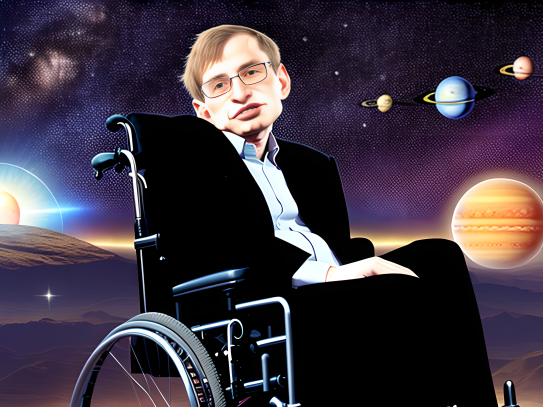
Frankl's insights remind us that our internal landscape is the true frontier of freedom. It's a sentiment mirrored by theoretical physicist Stephen Hawking, who explored the cosmos despite his physical constraints.
His forays into the enigmatic realms of black holes and quantum mechanics invariably brushed against the philosophical. Hawking's stance wittily undercut the deterministic universe implied by predestination, despite his scientific musings hinting at a cosmos governed by fixed laws.
Hawking wryly observed that even those who believe in predestination exercise caution, a nod to the inherent human recognition of control.
These reflections from varied experts converge on a singular truth: the power of the human spirit to transcend external limitations.
He famously quipped that people who believe in predestination still look both ways before crossing the street.
This observation highlights a paradox: the coexistence of a deterministic framework with the human experience of free will.
Hawking's point illuminates our instinctive
They collectively affirm the Stoic principle that while the world may unfold unpredictably, our responses remain within our purview.
Enriched by modern insights, this Stoic wisdom remains a profound guidepost for navigating life's unpredictable tides.
Epictetus on Focusing on What We Can Control

Epictetus, a sage of Stoicism, championed focusing solely on the factors within our control. He posited that tranquillity and empowerment stem from this singular concentration, as it aligns our energies with actionable realms.
This philosophy emphasises that while the external world is fraught with variables beyond our sway, our internal choices remain ours to command. Epictetus urged a disciplined introspection, where the will to act is not tethered to the unpredictable nature of external events.
By advocating for a clear-eyed assessment of our own volition, he laid the groundwork for personal sovereignty.
Epictetus underscored the futility of lamenting or desiring the unattainable, instead encouraging a Stoic embrace of our agency.
In his teachings, the delineation between our actions and the world's actions is stark, fostering a resilience impervious to life's vicissitudes. One can achieve inner peace through this disciplined approach, regardless of outside tumult.
Epictetus's wisdom remains a beacon for those seeking to navigate life with poise and purpose. His voice, from the distant past, still resonates, guiding us towards mastery over the one domain we truly possess ourselves.
The Dichotomy of Control in the Modern World
The dichotomy of control, a vestige of Stoic philosophy, finds renewed significance in the complexity of modern living. Amidst the rapid technological advancements and societal shifts, this Stoic principle is an anchor, grounding us in the face of overwhelming choice and change.
Today, our lives are inundated with information and options, leading to decision fatigue and a sense of being adrift. The Stoic's guide to serenity, the dichotomy of control, cuts through this noise, reminding us to channel our energies into realms where we have trustworthy agency.
In an era characterised by a constant bombardment of external stimuli, discerning what is within our control becomes not just philosophical musing but a necessary strategy for mental well-being. It prompts a conscious curation of our digital and physical spaces, encouraging us to exercise control over our engagements and reactions.
Moreover, the dichotomy of control offers solace in the unpredictability of economic markets, political landscapes, and environmental concerns. It empowers us to adapt and respond with agility, focusing on personal action and perspective rather than succumbing to the anxiety of uncertain outcomes.
Thus, in the modern context, the dichotomy of control transcends its ancient origins, becoming a vital tool for navigating the intricacies of contemporary life. It fosters resilience and proactive living, ensuring we remain captains of our ships despite the world's relentless pace.
The Timeless Relevance of Stoic Philosophy and Stoic Wisdom
Stoic philosophy, with its profound insights into human existence, remains as pertinent today as it was in Ancient Greece and Rome. Its core tenets advocate for a life of virtue, serenity, and resilience, attributes that transcend the bounds of time and societal change.
The modern allure of Stoicism lies in its practicality; it provides actionable guidance for confronting life's adversities and uncertainties. In an age of relentless change and pervasive digital connectivity, the Stoic emphasis on inner tranquillity is appealing and essential for mental well-being.
Stoicism teaches the art of distinguishing between what we can control and cannot, a skill increasingly valuable in a world brimming with complexities. This wisdom imparts a sense of agency, empowering individuals to focus on their responses rather than succumbing to external chaos.
Moreover, the philosophy's stress on community and common humanity resonates deeply in our interconnected world. It reminds us that our actions ripple outward, influencing the collective fabric, thereby urging a life led with intention and regard for the greater good.
Thus, Stoicism, with its blend of personal ethics and social consciousness, offers a timeless framework for navigating the intricacies of life. It is a beacon that continues to guide individuals towards personal growth and societal harmony.
Adapting Ancient Wisdom to Contemporary Challenges
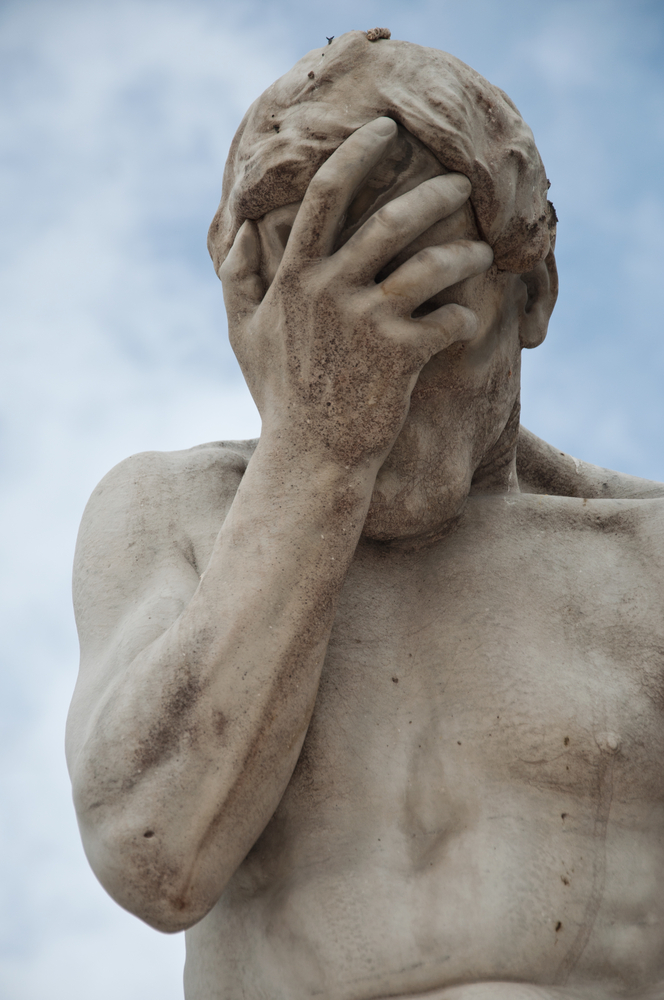
In a world awash with digital distractions and fast-paced change, the Stoic philosophy's call to focus on the controllable aspects of life is more relevant than ever.
Amidst the noise, this ancient wisdom offers a quiet space for reflection, urging us to identify what truly matters.
Modern life presents an array of challenges that can seem impossible, from climate change and political unrest to personal struggles with mental health and work-life balance.
Stoicism, with its dichotomy of control, provides a cognitive framework for tackling these issues, advocating a balance of acceptance and proactive engagement.
By internalising the Stoic practice of focusing on our own actions and responses, we gain the clarity to navigate complex societal issues with poise and determination.
It is about harnessing the power of our agency, directing our efforts towards positive change where we can, and cultivating inner peace in the face of the inevitable.
We find a path to resilience in applying Stoic principles to contemporary challenges.
This ancient philosophy encourages us to act with integrity and compassion, reminding us that we can constantly adjust our sails while we may not control the storm.
Conclusion
The dichotomy of control stands as a timeless beacon, guiding us to discernment and inner peace amidst life's chaos. It teaches us to focus on what we can influence and to accept what we cannot.
This Stoic, adaptable, profound wisdom remains a compass for personal growth and serenity. Embrace its principles and steer your life with purpose and tranquillity.
Take this moment to reflect: What will you choose to control today?
Sources
- 1.https://medium.com/stoicism-philosophy-as-a-way-of-life/the-importance-of-understanding-dichotomy-of-control-1f7133210c0d
- 2.https://www.orionphilosophy.com/stoic-blog/stoicism-and-the-dichotomy-of-control
- 3.https://modernstoicism.com/what-many-people-misunderstand-about-the-stoic-dichotomy-of-control-by-michael-tremblay/
- 4.https://dailystoic.com/eternal-stoic-question/
- 5.https://whatisstoicism.com/stoicism-definition/what-is-the-dichotomy-of-control/
- 6.https://www.psychologytoday.com/us/blog/365-ways-to-be-more-stoic/202304/the-stoic-dichotomy-of-control-in-practice
- 7.https://thestoicsage.com/dichotomy-of-control/
- 8.https://www.stoichandbook.co/the-dichotomy-of-control/
- 9.https://philosophybreak.com/articles/dichotomy-of-control-a-stoic-d

